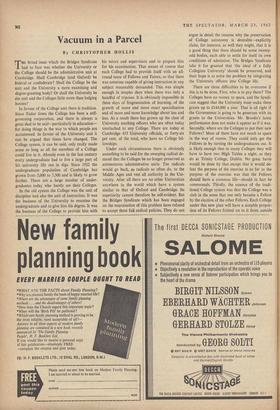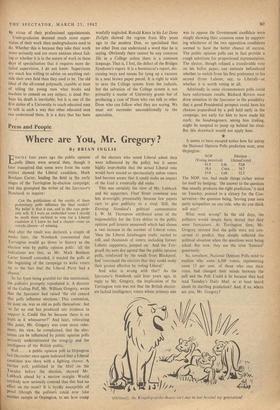Vacuum in a Parcel By CHRISTOPHER HOLLIS T HE broad issue
which the Bridges Syndicate had to face was whether the University or the College should be the administrative unit at Cambridge. Shall Cambridge (and Oxford) be federal or confederate? Shall the College be the unit and the University a mere examining and degree-granting body? Or shall the University be the unit and the Colleges little more than lodging houses?
In favour of the College unit there is tradition. Since Tudor times the College has been a self- governing corporation, and there is always a great deal to be said—particularly in education— for doing things in the way to which people are accustomed. In favour of the University unit it can be argued that times have changed. The College system, it can be said, only really made sense so long as all the members of a College could live in it. Already even in the last century every undergraduate had to live a large part of his university life out in digs. Since 1922 the undergraduate population of Cambridge has grown from 5,000 to 7,500 and is likely to grow further. There are a large number of under- graduates today who barely see their Colleges.
In the old system the College was the unit of discipline and also the unit of instruction. It was the business of the University to examine the undergraduate and to give him his degree. It was the business of the College to provide him with his tutors and supervisors and to prepare him for his examination. That meant of course that each College had to provide itself with an all- round team of Fellows and Tutors, so that there was someone capable of giving instruction in any subject reasonably demanded. This was simple enough in simpler days when there was only a handful of triposes. It is obviously impossible in these days of fragmentation of learning, of the growth of more and more exact specialisation and of more and more knowledge about less and less. As a result there has grown up the class of University teaching officers who are often today unattached to any College. There are today at Cambridge 433 University officials, or forty-six per cent. of the total, who have no College fel- lowships.
Under such circumstances there is obviously something to be said for the sweeping radical de- mand that the Colleges be no longer preserved as autonomous administrative units. The radicals would go back, as radicals so often do, to the Middle Ages and vest all authority in the Uni- versity. After all there are no other Universities anywhere in the world which have a system similar to that of Oxford and Cambridge. Its superiority cannot therefore be self-evident. But the Bridges Syndicate which has been engaged on the examination of this problem have refused to accept these full radical policies. They do not argue in detail the reasons why the preservation of College autonomy is desirable—explicitly claim, for instance, as well they might, that it is a good thing that there should be some twenty- odd bodies, each able to settle for itself its own conditions of admission. The Bridges Syndicate take it for granted that 'the ideal of a fully Collegiate University' should be preserved, and their hope is to solve the problem by integrating the University officers into College life.
There are three difficulties to be overcome if this is to be done. First, who is to pay them? The Colleges have no money to spare, and the Syndi- cate suggest that the University must make them grants up to £144,000 a year. That is all right if the Government is going to be generous with its grants to the Universities. Mr. Brooke's latest performance does not make it appear as if it was. Secondly, where are the Colleges to put their new Fellows? Most of them have not much to spare in the way of rooms. They could only get the Fellows in by turning the undergraduates out. It is likely enough that in many Colleges they will have to have two High Tables a night, as they do at Trinity College, Dublin. No great harm would be done by that except that it would de- feat the purpose of the exercise in so far as the purpose of the exercise was that the Fellows should have a common life—should in fact be commensals. Thirdly, the essence of the tradi- tional College system was that the College was a club in the sense that one only became a Fellow by the election of the other Fellows. Each College under this new plan will have a sizeable propor- tion of its Fellows foisted on to it from outside by virtue of their professional appointments.
Undergraduates demand much more super- vision of their work than undergraduates used to do. Whether this is because they take their work more seriously and are more anxious about fail- ing or whether it is in the nature of work in these days of specialisation that it requires more de- tailed supervision, I do not know. Supervisors are much less willing to advise on anything out- side their own field than they used to be. The old ideal of the all-round polymath, capable at least of telling the young men what books and teachers to consult on any subject, is dead. Per- haps his death is inevitable; but it is one of the first duties of a University to teach educated men to talk in such a way that other educated men can understand them. It is a duty that has been woefully neglected. Ronald Knox in his Let Dons Delight showed the regress from fifty years ago to the modern Don, so specialised that no other Don can understand a word that he is saying. Obviously there cannot be any common life in a College unless there is a common language. That is, I feel, the defect of the Bridges Syndicate's report. It is a bureaucrat's report, dis- cussing ways and means for tying up a vacuum in a neat brown paper parcel. It is right to wish to save the College system from the radicals, but the salvation of the College system is not primarily a matter of University grants but of producing a race of Dons who can talk to other Dons who can follow what they are saying. We must not surrender unconditionally to the specialists..



































 Previous page
Previous page